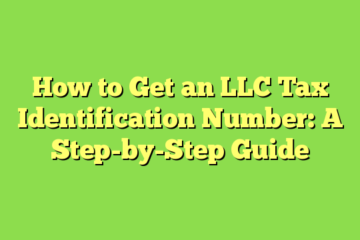Are you considering buying a house under an LLC? While this approach offers some benefits like liability protection, it also comes with drawbacks to weigh. This comprehensive guide examines everything you need to know about purchasing real estate through an LLC.
An LLC, or limited liability company, is a common business structure that provides personal liability protection for its owners (called members). An LLC has its own assets and income, separate from the members’ personal finances. Since an LLC is its own entity, it can buy real estate like a house or business property for any lawful purpose stated in its articles of organization.
Most LLC operating agreements do permit buying real estate. However, purchasing a residential home for personal use through an LLC can get messy. This is because all members share responsibility for the LLC’s operations as both owners and managers.
An LLC offers flexibility for taxation, ownership, and management. The number of members is unlimited, ranging from one to hundreds. Still, there are solid reasons to ponder buying or refinancing property under an LLC rather than your name. These include:
- Liability protection
- Separating business and personal finances
- Pass-through taxation
Funding an LLC Real Estate Purchase
Before approaching lenders, make sure your LLC is registered and in good standing with your state. Lenders may request the operating agreement when applying for an LLC mortgage for a rental property. This document defines the ownership stakes, rules, and member duties.
Portfolio lenders may provide better rates for real estate investors as this shows lower risk. Owning investment properties under an LLC demonstrates you run a real estate business, which builds credibility.
An LLC should buy real estate with its own money to avoid confusion if the assets must later be divided, like in lawsuits. However, members can lend funds to the LLC for a property purchase. Document these transactions properly on required state forms.
The LLC can apply for traditional mortgages, which lenders approve based on the business’s debts and credit score. Establish business credit before seeking an LLC real estate loan. Also, keep personal and business finances completely separate.
Benefits of Buying a House With an LLC
Purchasing real estate through an LLC offers several potential advantages. Top benefits include liability protection, tax perks like pass-through taxation, privacy, and the ability to keep personal and business finances separate. Forming an LLC for real estate investing merits consideration for these key reasons
Here are some top reasons to consider buying a home under an LLC:
Tax Advantages
In certain states, LLC members may transfer personal real estate holdings into the LLC tax-free.
Bolsters Business Profile
A new LLC that purchases property can add it to its investment portfolio to build company value and financial strength. The LLC can also generate income by renting out the property.
Liability Protection
Owning a house under an LLC shields your personal assets if you’re sued in connection with the property. For example, if someone slips and falls on the premises and sues, any judgment would be against the LLC only, not your personal assets.
Privacy
Buying real estate under an LLC makes it much harder for people to find out what you paid for a property. Public records only disclose the LLC’s name, not yours. This appeals to celebrities and others desiring privacy.
Potential Drawbacks of Buying a House Through an LLC
Purchasing real estate through an LLC offers several potential advantages. Top benefits include liability protection, tax perks like pass-through taxation, privacy, and the ability to keep personal and business finances separate. Forming an LLC for real estate investing merits consideration for these key reasons.
While using an LLC to purchase real estate has advantages, there are also some downsides to note:
- Harder to obtain financing since most lenders shy away from lending to LLCs for residential purchases. Options like FHA loans are only for individuals.
- LLCs pay higher interest rates than individuals buying primary residences. Individual borrowers also get tax perks like mortgage interest deductions that LLCs cannot claim.
- Co-mingling personal and business affairs is tempting for LLC owners who live in a property purchased by their LLC. Keeping things separate takes discipline.
- Some co-op boards dislike LLC ownership of units. Acceptance depends on building and area. Old-school neighborhoods tend to frown on it more than new developments.
Why Form an LLC for Real Estate Investing?
Starting an LLC for real estate may sound intimidating but offers many perks if done right. You need a solid business plan first to decide if an LLC aligns with your goals.
Here are key factors to weigh:
Liability Protection
The liability coverage offered by an LLC appeals to investors worried about lawsuits. This differs from basic liability insurance, which has more limitations. Real estate pros investing in multiple properties benefit tremendously from the protections of an LLC structure.
Personal Asset Protection
Creating an LLC for real estate investments separates them from your personal assets.
If an LLC investment gets sued, your personal finances stay safe. This enables expanding your portfolio with less risk.
Pass-Through Taxation
This popular LLC feature means the IRS taxes members personally on LLC income, but the LLC itself does not get taxed. For real estate, this means no double taxation on appreciation or rental income.
Overall, forming an LLC for real estate ownership offers useful benefits. But consult professionals to decide if it’s right for your goals.
How Pass-Through LLC Taxation Works
We’ve covered liability protection, but pass-through taxation is another LLC advantage. For some investors, the tax benefits make an LLC worth creating to hold real estate.
With pass-through taxation, LLCs avoid corporate double taxation: The IRS doesn’t tax the entity, just the owners. Depending on number of members, the IRS treats LLCs as sole proprietorships or partnerships.
Single-member LLCs are disregarded entities. Their profits and losses pass through to the sole owner. The owners, not the business itself, pay taxes on company income.
LLCs provide liability protection lacked by sole proprietorships, along with pass-through taxes. For property owned through an LLC, appreciation and rental income avoid extra taxes.
Multi-member LLCs also enjoy pass-through taxation. But each member must report their profit/loss share on tax returns. The LLC itself still pays no entity-level taxes.
Overall, real estate LLCs offer useful benefits like liability protection and beneficial pass-through taxation.
Should You Buy a House Under an LLC
The decision depends on weighing the pros and cons for your situation. Top pros are liability protection and tax perks, while major cons are financing challenges and higher rates. Consult professionals to decide if an LLC fits your investment goals and budget. Carefully evaluate both benefits and drawbacks first.
Pros of Buying a House With an LLC:
- Liability protection for rental properties or lawsuits
- Tax benefits like pass-through taxation
- Privacy and asset protection
Cons of Buying a House With an LLC:
- Difficulty obtaining financing compared to personal mortgages
- Higher interest rates than primary residence loans
- Extra legal fees and paperwork
Bottom Line:
- Evaluate your goals, property type, and budget
- Consult professionals to decide if an LLC fits your needs
- Look into financing options that allow LLC borrowers
- Keep business and personal use separate
Buying real estate under an LLC has advantages but also downsides to weigh. While not right for everyone, an LLC can be a strategic move for certain real estate investors.
Conclusion
Purchasing a house under an LLC allows certain benefits like liability protection and tax perks. However, it also comes with drawbacks to consider like higher interest rates and financing challenges.
Thinking about buying a property under an LLC? Weigh the pros and cons carefully. Consult professionals to decide if using an LLC aligns with your real estate investment goals and overall financial situation. With careful planning, an LLC can provide strategic advantages for real estate ownership.
Frequently Asked Questions
Can you get a mortgage under an LLC?
Yes, it is possible but can be more challenging than getting a personal mortgage. Many lenders shy away from lending to LLCs, especially for residential properties. Shop around for an investor-friendly lender willing to approve an LLC purchase.
Does an LLC protect you from personal liability?
If properly structured and maintained, an LLC can shield your personal assets from liability related to the real estate. Any lawsuits would be against the LLC only, not your personal assets or finances.
What are the tax benefits of a real estate LLC?
LLCs allow pass-through taxation, so you avoid corporate double taxation. Appreciation and rental income pass through and are taxed only on the members’ personal returns, not the LLC entity.
Can I buy a primary residence under an LLC?
You can, but there are drawbacks. It is harder to get financing, interest rates are higher, and you lose out on tax perks for primary mortgages available only to individuals.
How much does it cost to set up a real estate LLC?
Costs vary by state but often range $100-$800 for LLC formation, plus ongoing legal/accounting fees. Shop around to find affordable providers to establish and maintain your real estate LLC.






